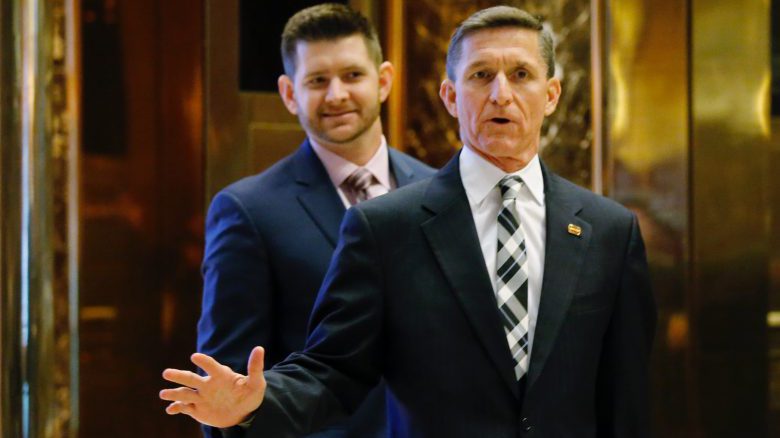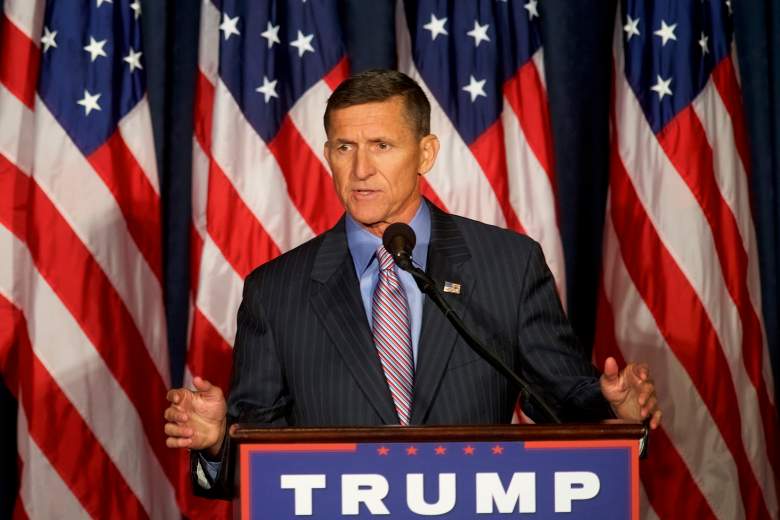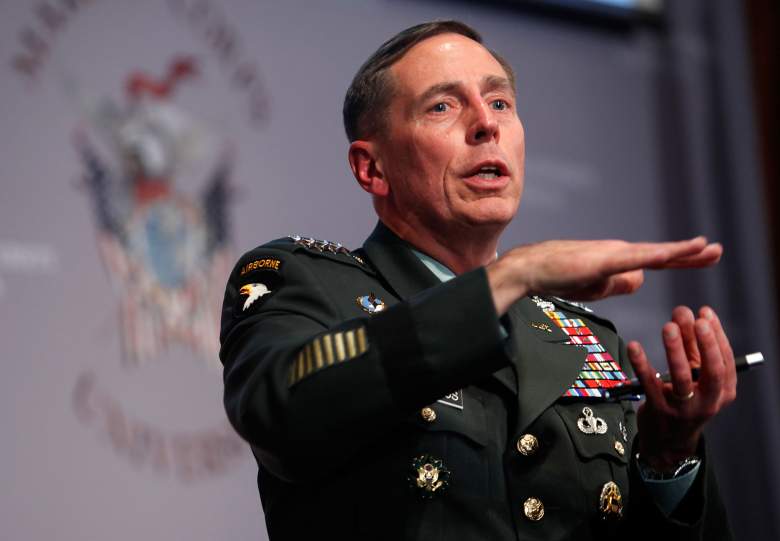
Retired Lt. Gen. Michael Flynn arrives at the Trump Tower for meetings with US President-elect Donald Trump, in New York on November 17, 2016. (Getty)
Michael Flynn has admitted he gave Vice President Mike Pence “incomplete information” about his communications with the Russian ambassador, he says inadvertently. But did Flynn lie to the FBI?
A report in The New York Times raised questions about that possibility, although it’s far from clear. Not being entirely forthcoming with the VP cost Flynn his job, according to Press Secretary Sean Spicer. If it were ever proven that Flynn, who just resigned as national security adviser, lied to the FBI, that could possibly be a crime, even a felony.
However, CNN is now reporting, according to law enforcement officials, that the FBI is not planning to pursue charges against Flynn because agents don’t believe he tried to mislead them. Although Flynn initially said he didn’t talk about sanctions with the Russian ambassador, when pressured on it, he said he didn’t recall, according to CNN.
The New York Times reported that the FBI questioned Flynn about his calls with the Russian ambassador a few days after he became national security adviser. The Times cited anonymous sources in reporting “that investigators had come away believing that he (Flynn) was not entirely forthcoming,” but said it wasn’t clear what Flynn told the FBI.
Flynn has already acknowledged not giving the VP complete information.
“Unfortunately, because of the fast pace of events, I inadvertently briefed the Vice President Elect and others with incomplete information regarding my phone calls with the Russian Ambassador,” Flynn said in his resignation letter. “I have sincerely apologized to the President and the Vice President, and they have accepted my apology.”

Michael Flynn speaks at the The Union League of Philadelphia. (Getty)
According to Criminal Law Lawyer Source, “it is a criminal offense to lie to a federal government official….Title 18 of the US Code, Section 1001, a favorite of federal prosecutors, makes it unlawful to lie to a government agent.” The Department of Justice has a policy not to charge people with “false statements to a federal investigator” for denying guilt upon questioning from the FBI. One legal article says the charge is a “commonly used federal charging statute, Section 1001. This statute makes it a crime to ‘knowingly and willfully’ give false statements in any matter under federal jurisdiction.”
According to Federal Criminal Lawyer, “The law against making a false statement to an agent of the federal government is 18 USC 1001. The statute says it is against the law to knowingly and willfully make any materially false, fictitious or fraudulent statement or representation concerning in any matter within the jurisdiction of the executive, legislative or judicial branch of the United States. The sentence for this crime can be 5 years in federal prison.”
Some prosecutions being raised as possible comparatives: The felony case against Scooter Libby, the aide to Vice President Dick Cheney. Among other charges, Libby was convicted of a crime for lying to the FBI as it investigated the leak of the name of Valerie Plame, who had been an undercover CIA operative. President George W. Bush eventually commuted his prison sentence.
And then there’s John Poindexter, Ronald Reagan’s national security adviser, who was “charged with deceiving and lying to Congress as part of an effort to conceal the Reagan Administration’s actions in the Iran-contra affair,” according to The New York Times. An appeals court later tossed out Poindexter’s convictions.
Martha Stewart was indicted “under Title 18, United States Code, Section 1001, for lying to federal government agents.” Some Republicans alleged that Hillary Clinton might have lied to the FBI or Congress because of contradictory statements over her email server, but she was never charged with a crime.

Petraeus in 2009. He was considered an expert on counterinsurgency. (Getty)
And perhaps ironically, part of the criminal case that led to a conviction against retired General David Petraeus (under consideration to replace Flynn) involved lying to the FBI.
Ultimately, Petraeus pleaded guilty to a misdemeanor charge of mishandling classified information in a plea deal that saw him receive probation and a fine. ABC News said Petraeus received 2 years probation and a $100,000 fine for what the network called “classified leaks.” ABC reported that Jill Westmoreland Rose, the acting U.S. Attorney handling the case, had said: “Today David Petraeus admitted that he removed and obtained classified and that he lied to the FBI and CIA.” There’s no evidence, of course, that any of the Flynn conversations involved classified materials, but the allegation of lying to investigators featured into the Petraeus prosecution.

Russian Ambassador to the U.S. Sergey Kislyak. (Russian embassy)
Flynn’s now famous conversation with the Russian ambassador included talk of sanctions, according to reports in the New York Times and Washington Post. This is important because the conversation occurred the day before Barack Obama, who was still president, imposed sanctions on Russia. The conversation “was being monitored by NSA officials eavesdropping on the Russian ambassador,” according to The New York Daily News. That means a transcript apparently exists of what Flynn said during the conversation.
According to The Atlantic, “The bureau had been investigating whether his post-election phone call with Russian ambassador Sergei Kislyak violated the Logan Act.” The Atlantic reported that, although no one has every been prosecuted under the Logan Act, “plenty of high-ranking government officials have gone to jail or suffered other legal penalties for perjury and obstruction of justice.” In other words, if it were ever proven that Flynn lied, that’s a serious offense.
The magazine cited examples including Bill Clinton’s impeachment for lying about the Monica Lewinsky affair (although the president was not charged with a crime) and Libby, “who was convicted of perjury, obstruction of justice, and making false statements after he lied to the FBI agents investigating the Valerie Plame” leak. According to NBC News, the charges against Libby included “one count of lying to the FBI about how he learned Plame’s identity and whom he told.”
Spicer told the news media February 14 that Flynn’s resignation stemmed from a lack of trust. “We’ve been reviewing and evaluating this issue with respect to General Flynn on a daily basis for a few weeks, trying to ascertain the truth,” Spicer said, according to The New York Daily News.
There’s also the matter of the Logan Act. The Logan Act is a law that no one has ever been found guilty of violating, despite being on the books since 1798, according to The Washington Post, which added, “It seems its main purpose these past 200 years has been as a political weapon for the opposition party to cast doubt on the other party’s foreign policies.”
The Logan Act reads as follows, according to Cornell University:
Any citizen of the United States, wherever he may be, who, without authority of the United States, directly or indirectly commences or carries on any correspondence or intercourse with any foreign government or any officer or agent thereof, with intent to influence the measures or conduct of any foreign government or of any officer or agent thereof, in relation to any disputes or controversies with the United States, or to defeat the measures of the United States, shall be fined under this title or imprisoned not more than three years, or both.
The New York Times reported that some officials believed Flynn’s conversation with the ambassador was potentially a Logan Act violation. However, the Times reported that it would be very unusual for the law to be prosecuted because it is “murky” during presidential transition periods.
The history of the Logan Act dates back to the founding days of the country. “During the presidency of John Adams, Dr. George Logan, a private citizen, engaged in freelance diplomacy with the government of revolutionary France. The Federalists, then in control of the federal government, were not pleased by what they perceived as Dr. Logan’s interference with the foreign policy of the United States,” according to an article published by Oxford University Press’ blog.
According to Reuters, the Logan Act “is aimed at preventing the undermining of official U.S. government positions.” Some Democrats also accused Donald Trump of violating it at different points during the campaign, and some have argued it’s antiquated and doesn’t work in modern communication times.